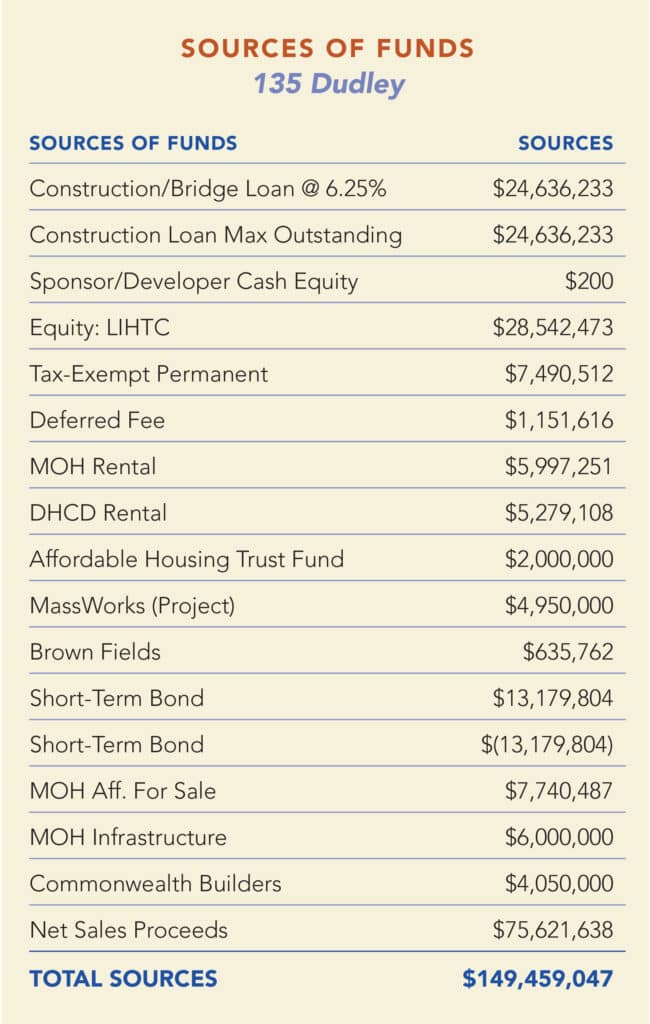Boston Compay Invests in Minority Neighborhoods

By Mark Fogarty
7 min read
Another Kind of Mix in Boston Mixed Developments
Boston’s Cruz Companies is currently developing two mixed-income, mixed-use properties in the Roxbury/Nubian Square area of the city. But Cruz is also adding a third “mix” to traditional mixed developments: it is developing both rental and ownership homes in the same project.
“We’re finishing up a 55-unit affordable housing complex, with commercial on the first floor,” says John B. Cruz III, president, and chief executive of the minority-owned firm, which was started in 1948 by his father, John B. Cruz Jr. “The commercial space is where our new office is going to be.”
The total development cost for this project, the Michael E. Haynes Arms, is about $40 million.
Nearby, the company has plans for a 170-unit mixed-use, mixed-income, mixed-housing type project, currently called 135 Dudley at Nubian Square (it also includes a second building at 145 Dudley). This is a two-building development—one rental, one for-sale condo—situated at either end of a plaza with a parking garage below it.
The 60 rentals will be all affordable housing in a five-story building, while the condos will be in a ten-story building across the plaza, says Cruz. Eighty-three of the condos will be at market rates while the other 27 will be in the workforce housing range.
Cruz’s program truly incorporates a diversity of incomes, whereas it provides housing opportunities for folks/families at 30, 50, 60, 80 and 100 percent of the area median income. It addresses development without displacement and responds to gentrification by providing affordable opportunities that will keep residents in their community, which is a key goal for the Roxbury community.
The rental building will have retail space, including a place for the local chapter of the National Association for the Advancement of Colored People (NAACP). The NAACP will have use of the office space rent-free for ten years.
The names of the developments are fluid just now since Cruz Companies is moving away from naming properties after street addresses—One Waverly, 135 Dudley—to names honoring prominent Black Boston citizens.
New Names for Projects
So, these three buildings (in two projects) will carry the names of John B. (Bertie) Cruz Jr., former NAACP official Lenny Alkins and the Rev. Michael E. Haynes. Mr. Alkins’ name will be on the building containing office space for the NAACP. The condo tower will be named for Mr. Cruz. (Cruz also sponsors NAACP scholarships.)
The buildings at 135 and 145 Dudley, a $150 million project between the two, are on a street named for Thomas Dudley, a former governor of Massachusetts. However, Dudley was a slave owner, so Cruz doesn’t want that name to be on his building. This mirrors a community action several years ago when Dudley Square was renamed Nubian Square.
When Cruz joined his father’s firm, he helped it expand beyond being just a carpentry subcontractor.
“We went from a carpentry subcontractor into general contracting. And from there we were able to diversify into development because at the time after some of the major riots in various cities during the 1960s, cities were coming out with programs to develop or help promote development,” he says.
Cruz is now involved in all phases of development—construction, development, relocation and management. It developed its first project, Taurus Apartments, in 1973.
“It’s 50 years old this year. It’s still owned by us,” says Cruz. “It’s still affordable and we’re extremely proud of the way the thing looks now. And the pride that we took in constructing it.”
Advocate for Minority Neighborhoods
Cruz became an advocate for building good housing in the Black areas of Boston where he grew up, such as Dudley Square, now Nubian Square. (His family is originally from the Cape Verde Islands off the west coast of Africa.)
“I was used to going out with my father and the crew to work in the suburbs on either single-family or multifamily housing. And it always bothered me that we never had anything as nice as what was being built in the suburbs. And I always said, hopefully, one day I’ll be able to replicate what I see in the suburbs, in our own community,” he remembers.
“It’s in our DNA. We have a sensibility of what’s lacking. We try to do more than just build housing. We put money back into the community. We know how important jobs and businesses are to fill the wealth gap. In every Cruz Companies project, at least 60 percent of the contractor payments go to firms of color.”
Daniel Cruz Jr., senior vice president, Cruz Development, says, “That’s a minimum. We’re always able to exceed it. It’s now about 75 percent utilization of minority business and 80 to 85 percent minority workers.” Cruz’s own staff is more than 90 percent people of color.
Cruz Development projects have provided high-quality, affordable rental housing that improves the quality of life and offers stable, well-managed apartment properties for thousands of residents in predominantly minority neighborhoods, including families and the elderly who also have access to crucial services provided by Cruz Management. Cruz Development projects have introduced both affordable rentals and created accessible homeownership opportunities in these same communities, opening the door for long-term wealth generation and encouraging economic growth.
In the future, as a third-generation Black-owned firm, John Cruz and his son Justin Cruz are looking to continue expanding out of Massachusetts. Building on past projects, including a 460-unit mixed-use high-rise residential tower in Miami, Cruz is planning a development in College Park, MD. “We hope to make that beachhead into the Maryland-Washington, DC corridor,” says John Cruz.
Sidebar:
A Legacy Extends Back for 75 Years
(John B. Cruz III reminisced for Tax Credit Advisor on the long history of the Cruz Companies, started in 1948 by his father, John B. Cruz Jr. Here is an excerpt.)
My father, John B. Cruz Jr., started the company in 1948 in Boston as a carpentry subcontracting company. We used to do framing work for the various single-family and multifamily builders in the area.
It wasn’t easy for my father to start this business, but he survived and continued to grow despite being a Black man. At that time, there were no programs that partnered with cities, states or any other agencies to bring more people of color into the mainstream of construction.
In spite of the adversities, he succeeded, because we used to have this preached to us by older people, that you have to be twice as good to get half as much. So that’s what my father did. And he was good at what he did.
At that time, his work was not coming from the Black community where we live. It was coming from the suburbs where white builders, both single-family and multifamily, were building homes. It was a competitive business.
We’ve always felt that it’s hard out there, but you can compete, and you can be as good as anyone else. And that’s the DNA of the firm, so I was blessed, to be able to go to Wentworth (Institute of Technology) and to have come out and helped my father grow the firm from a carpentry sub-contracting firm.
He was happy with that. And he was doing this for my dream, not for his dream.

